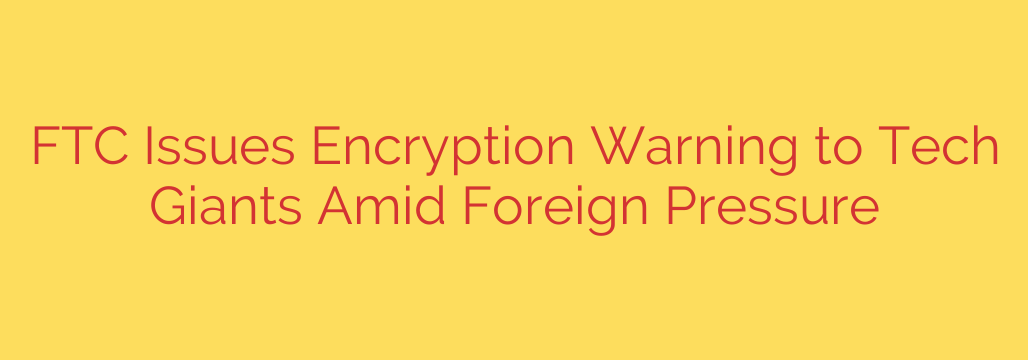
Your Data Security is at Risk: FTC Warns Big Tech Against Weakening Encryption
In an age where our digital lives are constantly expanding, the security of our private data has never been more critical. End-to-end encryption is the digital lockbox that protects our private messages, financial data, and personal information from prying eyes. However, this fundamental security feature is now at the center of a high-stakes debate between user privacy and government access. Stepping firmly into this arena, the U.S. Federal Trade Commission (FTC) has issued a stern and unambiguous warning to major technology companies: do not compromise encryption.
The message from the FTC is clear: companies that weaken their security measures in response to pressure from foreign governments could face legal consequences for deceptive and unfair practices. This powerful statement underscores the growing tension between global tech platforms and national laws demanding access to encrypted user data.
The Core of the Warning: A Backdoor for One is a Backdoor for All
The central argument from the FTC revolves around a core principle of cybersecurity. Governments, particularly in countries like the United Kingdom, are increasingly pushing for legislation that would require tech companies to create “backdoors” into their encrypted services. The stated goal is to allow law enforcement to access communications to combat crime and terrorism.
However, the FTC and cybersecurity experts warn that this is a dangerously flawed approach. A backdoor built for one government is a vulnerability that can be exploited by anyone—including hostile nations, sophisticated hackers, and criminal organizations. There is no way to create a “good guys only” key to encrypted data. Once a weakness is intentionally created, it fundamentally breaks the promise of security for every user on the platform.
The commission emphasized that if a company advertises its services as secure and private, it must live up to that promise. Misrepresenting the security of a product or service after intentionally weakening its encryption would be considered a deceptive practice under U.S. law.
What’s at Stake? The Dangers of Compromised Encryption
The integrity of end-to-end encryption is not just an abstract technical issue; it has profound real-world consequences. Weakening these standards would dismantle the very foundation of digital trust and security.
The potential risks include:
- Exposure of Personal Data: Your private conversations, financial transactions, health records, and location data could be exposed.
- Threats to Businesses: Companies rely on encryption to protect trade secrets, intellectual property, and sensitive client information.
- Endangering Vulnerable Individuals: Journalists, activists, and dissidents in oppressive regimes depend on secure communication to protect themselves from persecution.
Tech companies now find themselves caught between complying with international laws and protecting the fundamental security of their global user base. The FTC’s warning serves as a crucial reminder that their primary responsibility is to their users and the promises of privacy and security they have made.
How You Can Protect Your Digital Privacy
While this debate plays out at the highest levels, there are proactive steps you can take to safeguard your personal information. Strong digital hygiene is more important than ever.
Choose Services with Strong End-to-End Encryption: Opt for messaging apps and services that have a proven commitment to end-to-end encryption by default, such as Signal or WhatsApp. Be aware of the privacy policies of the platforms you use.
Enable Two-Factor Authentication (2FA): Even if your data is encrypted, your account can be compromised. 2FA adds a critical second layer of security, making it much harder for unauthorized individuals to access your accounts.
Use Strong, Unique Passwords: Avoid reusing passwords across different services. A password manager can help you generate and store complex, unique passwords for all your accounts.
Stay Informed: Pay attention to news about data privacy and technology legislation. Understanding the issues allows you to make more informed choices about the services you use and the data you share.
The FTC’s powerful stance marks a pivotal moment in the global conversation about encryption. It sends a clear signal that the security and privacy of users cannot be sacrificed for the convenience of government surveillance. As this issue continues to evolve, the strength of our digital defenses will depend on the unwavering commitment of tech companies to protect the data we entrust to them.
Source: https://www.bleepingcomputer.com/news/security/ftc-warns-tech-giants-not-to-bow-to-foreign-pressure-on-encryption/








